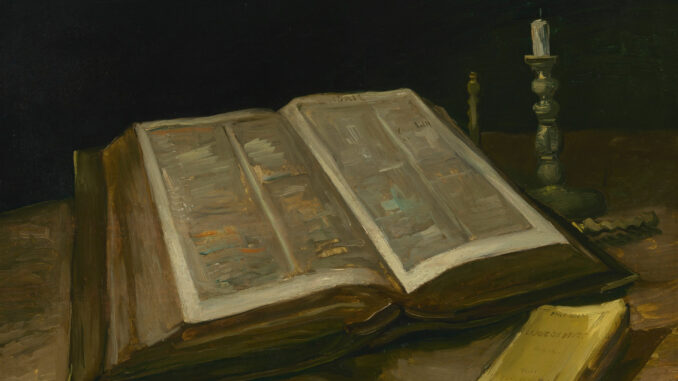
CAPTION: “Still Life with Bible” by Vincent van Gogh (1885) is a painting in the collection of the Van Gogh Museum, Amsterdam. (Public Domain)
By Charles Naylor
Do I believe the old Book? Do I really believe it? My heart answers that I do. The deepest consciousness of my soul testifies that it is true. I will tell you some of the reasons why I believe it.
The Bible is the oldest, and still the newest, of books. God’s book reaches back not only to the “beginning” of this terrestrial world, but into eternity. It is the book of eternity, and within its folds lie the grandeur and sublimity of the great unknown future.
It never gets out-of-date. Other books have their run of popularity and are forgotten — but the Bible never grows old. To the Christian, it never grows stale — but is always fresh and always satisfying. It reveals new depths that we fail to fathom, new heights that we cannot scale, and new beauties that enrapture our vision.
When we read a book written by man, however interesting it may be, it soon loses its interest and its charm. We do not find new beauties in it as we do in the Bible. Its treasures are soon exhausted — but the Bible is ever new,
The Bible is the most loved of all books. Wherever the Bible goes, people learn to love and to treasure it above all other books combined. It is the one book that people love — it is the treasure that people hold fast even at the risk of their lives.
It is also the most-hated book. I suppose more books have been written against the Bible than against all other books combined. Men do not hate Shakespeare, Milton or Longfellow. They do not hate works on science, books of travel, or other sacred texts of the world. They hate only the Bible. It could be that critics find in the Bible something they find nowhere else — a true picture of themselves and the picture is not pleasant to look upon.
The Bible is judged by a standard far more stringent than any other book. No critic would think of treating any other book as he treats the Bible, nor of requiring of any other book what he requires of the Bible. The more men hate God — the more they hate his Word.
The Bible has withstood all assaults. The greatest intellects of modern times find themselves baffled by it. The sharpest arrows forged by unbelief have not pierced it. Countless critical theories — religious, philosophic, scientific — have only brightened and made it better known. It is the law of nature that error is self-destructive — but that truth cannot be destroyed; and according to this law, the Bible must be true because of its indestructibility.
The Bible tells me of myself. My deepest emotions and longings, my highest thoughts and hopes, are mirrored there. It speaks of my secret ambitions, dearest hopes and deepest fears. No man can know me as the Bible knows me.
The Bible gives comfort. To what book do those in sorrow turn? To Voltaire? to Ingersoll? Do they turn to poetry or fiction? Scripture is a letter from home to the forlorn wanderer or a mother’s voice to the child. Friends may speak words to comfort us — but they cannot comfort us as does the Book.
It is also the book of hope. Sometimes man despairs, and he looks here and there for hope, finding none — but there is one book in which hope may always be found. In the troubled soul, it brings calm. It lifts up the stricken, strengthens the feeble and restores the courageous.
The Bible is the book of the dying. For what book do the dying call? There is but one book for that hour. There is but one book which can throw light into that shadowy valley. That is the Bible.
The Bible contains the only answer to the enigma of life. The “why” of life is found nowhere else. Other books tell us many truths about life, but Scripture interprets life. Men have sought everywhere for the secret of life and the things that pertain thereto — but everywhere, except in the Bible — they find only darkness, obscurity and uncertainty.
The Bible outlives all its critics. It has many times been pronounced dead, but still it lives. Those who anchor their faith upon it need not fear what voice is raised against it for it is truth, and those who fight against it fight against God and are themselves ruined.
The Bible is adapted to all people of every race and climate, to the high and the low, the rich and the poor, the learned and the ignorant. It is the Book of books.
Charles Wesley Naylor is considered one of the most prolific and inspiring songwriters of the Church of God. He was bedridden for much of his adult life but wrote eight books, a newspaper column and over 150 songs. Many of his writings are in the public domain.



